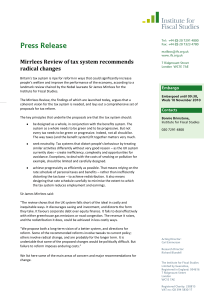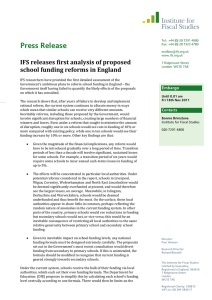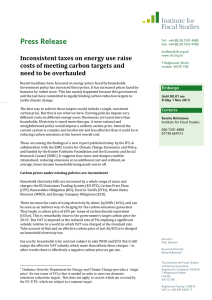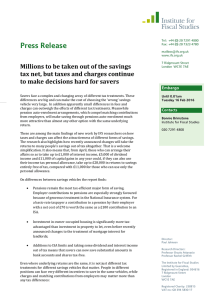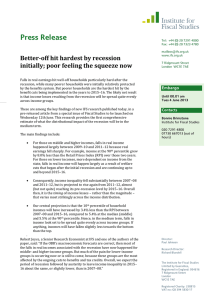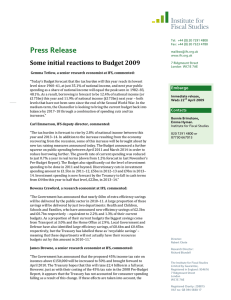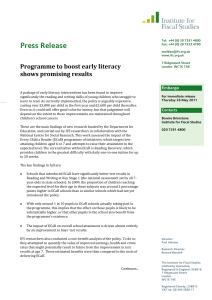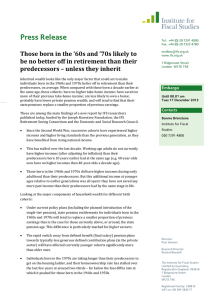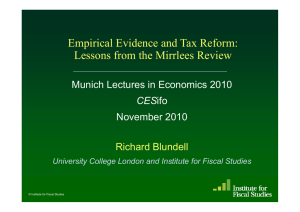Press Release Mirrlees Review of tax system published today
advertisement
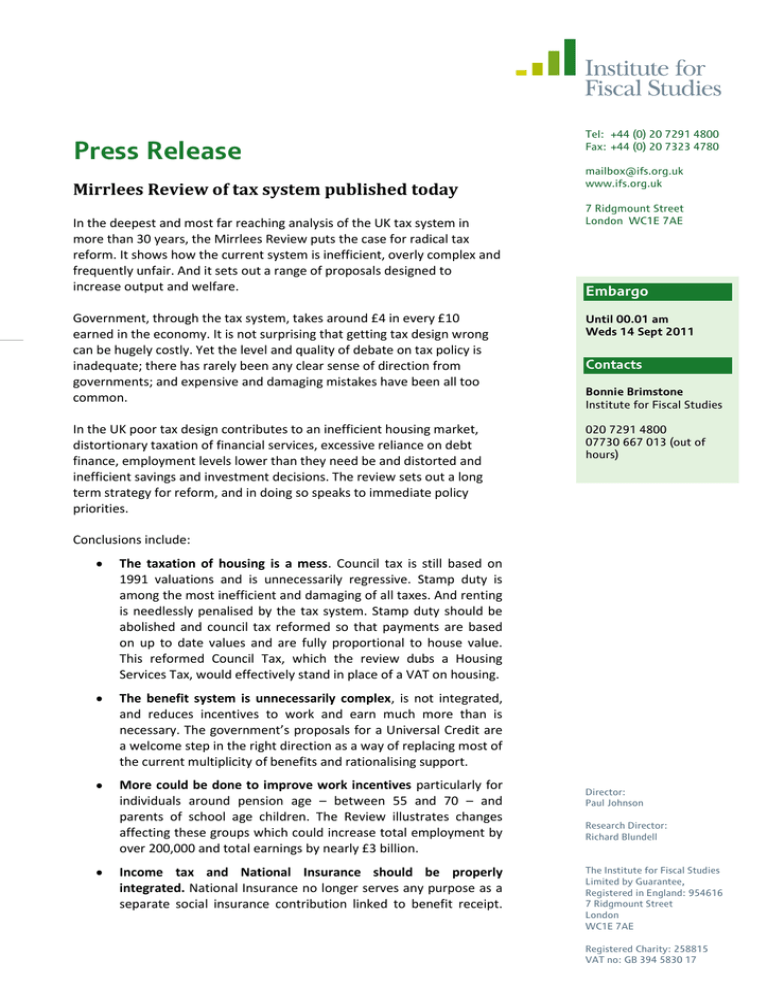
Press Release Mirrlees Review of tax system published today In the deepest and most far reaching analysis of the UK tax system in more than 30 years, the Mirrlees Review puts the case for radical tax reform. It shows how the current system is inefficient, overly complex and frequently unfair. And it sets out a range of proposals designed to increase output and welfare. Tel: +44 (0) 20 7291 4800 Fax: +44 (0) 20 7323 4780 mailbox@ifs.org.uk www.ifs.org.uk 7 Ridgmount Street London WC1E 7AE Embargo Government, through the tax system, takes around £4 in every £10 earned in the economy. It is not surprising that getting tax design wrong can be hugely costly. Yet the level and quality of debate on tax policy is inadequate; there has rarely been any clear sense of direction from governments; and expensive and damaging mistakes have been all too common. Until 00.01 am Weds 14 Sept 2011 In the UK poor tax design contributes to an inefficient housing market, distortionary taxation of financial services, excessive reliance on debt finance, employment levels lower than they need be and distorted and inefficient savings and investment decisions. The review sets out a long term strategy for reform, and in doing so speaks to immediate policy priorities. 020 7291 4800 07730 667 013 (out of hours) Contacts Bonnie Brimstone Institute for Fiscal Studies Conclusions include: The taxation of housing is a mess. Council tax is still based on 1991 valuations and is unnecessarily regressive. Stamp duty is among the most inefficient and damaging of all taxes. And renting is needlessly penalised by the tax system. Stamp duty should be abolished and council tax reformed so that payments are based on up to date values and are fully proportional to house value. This reformed Council Tax, which the review dubs a Housing Services Tax, would effectively stand in place of a VAT on housing. The benefit system is unnecessarily complex, is not integrated, and reduces incentives to work and earn much more than is necessary. The government’s proposals for a Universal Credit are a welcome step in the right direction as a way of replacing most of the current multiplicity of benefits and rationalising support. More could be done to improve work incentives particularly for individuals around pension age – between 55 and 70 – and parents of school age children. The Review illustrates changes affecting these groups which could increase total employment by over 200,000 and total earnings by nearly £3 billion. Income tax and National Insurance should be properly integrated. National Insurance no longer serves any purpose as a separate social insurance contribution linked to benefit receipt. Director: Paul Johnson Research Director: Richard Blundell The Institute for Fiscal Studies Limited by Guarantee, Registered in England: 954616 7 Ridgmount Street London WC1E 7AE Registered Charity: 258815 VAT no: GB 394 5830 17 Maintaining it as a separate tax serves only to create confusion and complexity. VAT is needlessly complex and inefficient because it treats different types of spending inconsistently. It both favours, and creates immense complexity for, financial services. An equivalent to the VAT could, and should, be imposed on financial services. VAT should also be extended to nearly all spending. This would reduce complexity and costly distortions to consumption choices. The money raised could be spent on cutting income taxes and raising benefits in a way which is broadly distributionally neutral, and which protects work incentives. Environmental taxes impose arbitrary and inconsistent prices on carbon emissions from different sources. Some emissions are effectively subsidised by the tax system. There should be a consistent price on carbon emissions, through a combination of extended coverage of the EU Emissions Trading Scheme and a consistent tax on other emission sources. This would include a tax on domestic gas consumption. Taxation of petrol and diesel is ineffective for tackling congestion – the main cost of driving. In addition, and as the OBR has pointed out, as cars become more efficient this significant source of government revenue will decline rapidly. We should work towards a comprehensive system of congestion charging on the roads, replacing most of fuel duty. The potential economic and welfare gains are very big. The taxation of savings needs a radical overhaul. Hugely different effective tax rates are imposed on returns to different forms of savings, resulting in extensive tax planning, disincentives to some forms of savings and poorly designed incentives for other savings, including pension savings. The risk-free or ‘normal’ return to saving should not be taxed, so that saving is not discouraged. Standard bank and building society accounts should be entirely free of tax, equity ISAs should be maintained and the main features of the current tax treatment of pensions should be retained. For other substantial holdings of risky assets only returns above the ‘normal’ rate should be subject to tax. These returns (income and capital gains) above the normal return should be taxed in full at the same rate schedule as earned income (including NICs), with reduced rates for dividends and capital gains on shares to reflect corporation tax already paid. Equalising the marginal tax rates on earnings and different forms of capital income in this way would reduce distortions between different economic activities and opportunities for avoidance. The corporate tax system favours debt finance over equity finance, increasing the tendency towards an excess reliance on debt. The review proposes that an Allowance for Corporate Equity should be introduced into the corporation tax. This would ensure equal treatment of equity- and debt-financed investments and that only profits above the normal return to capital invested are The Institute for Fiscal Studies Limited by Guarantee, Registered in England: 954616 7 Ridgmount Street London WC1E 7AE taxed. This reform could increase national income by as much as 1.4% (more than £20 billion at current prices). Summing up the findings Sir James Mirrlees said: “The Review shows that the UK system imposes unnecessary costs on the economy. It reduces employment and earnings more than it needs to. It discourages saving and investment, and distorts the form that they take. It favours corporate debt over equity finance. It fails to deal effectively with either greenhouse gas emissions or road congestion. It could raise as much revenue and achieve as much redistribution as it currently does in far less costly ways. We propose a clear long-term vision and direction of reform. While some of the reforms we recommend involve tweaks to current policy others involve change which is radical and is for the longer term. There is no getting away from the political difficulty associated with some of the proposed changes. But there is also no getting away from the enduring costs of failure to reform.” Paul Johnson, director of the IFS said: “There is little about the UK tax system which looks like it was deliberately designed. Successive governments have failed to set out a coherent strategy for tax. As a result the current set of taxes is complex and often incoherent and they impose a much greater cost on the economy than need be. The review shows how national income and employment could be significantly increased through effective tax reform. A government focussed on growth cannot afford to ignore some of the fundamental reforms required to the tax system. That does not mean small gimmicks and one-off allowances; it means a long term, considered and systematic approach to tax policy. This is an approach which has been sadly lacking for many years. As pressures on growth and on the public finances mount, the need for an efficient and effective tax system is greater than ever. The review provides one route to such a system”. ENDS Notes to Editors: 1) The Mirrlees Review has been funded by the Nuffield Foundation http://www.nuffieldfoundation.org/ and the Economic and Social Research Council (ESRC) http://www.esrc.ac.uk/ 2) For embargoed copies of the final report, please contact Bonnie Brimstone on 020 7291 4818 or at bonnie_b@ifs.org.uk. The Institute for Fiscal Studies Limited by Guarantee, Registered in England: 954616 7 Ridgmount Street London WC1E 7AE
